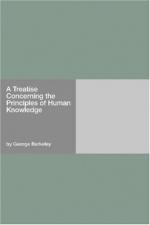97. Beside the external existence of the objects of perception, another great source of errors and difficulties with regard to ideal knowledge is the doctrine of abstract ideas, such as it has been set forth in the Introduction. The plainest things in the world, those we are most intimately acquainted with and perfectly know, when they are considered in an abstract way, appear strangely difficult and incomprehensible. Time, place, and motion, taken in particular or concrete, are what everybody knows, but, having passed through the hands of a metaphysician, they become too abstract and fine to be apprehended by men of ordinary sense. Bid your servant meet you at such a time in such a place, and he shall never stay to deliberate on the meaning of those words; in conceiving that particular time and place, or the motion by which he is to get thither, he finds not the least difficulty. But if time be taken exclusive of all those particular actions and ideas that diversify the day, merely for the continuation of existence or duration in abstract, then it will perhaps gravel even a philosopher to comprehend it.
98. Dilemma.—For my own part, whenever I attempt to frame a simple idea of time, abstracted from the succession of ideas in my mind, which flows uniformly and is participated by all beings, I am lost and embrangled in inextricable difficulties. I have no notion of it at all, only I hear others say it is infinitely divisible, and speak of it in such a manner as leads me to entertain odd thoughts of my existence; since that doctrine lays one under an absolute necessity of thinking, either that he passes away innumerable ages without a thought, or else that he is annihilated every moment of his life, both which seem equally absurd. Time therefore being nothing, abstracted from the sucession of ideas in our minds, it follows that the duration of any finite spirit must be estimated by the number of ideas or actions succeeding each other in that same spirit or mind. Hence, it is a plain consequence that the soul always thinks; and in truth whoever shall go about to divide in his thoughts, or abstract the existence of a spirit from its cogitation, will, I believe, find it no easy task.
99. So likewise when we attempt to abstract extension and motion from all other qualities, and consider them by themselves, we presently lose sight of them, and run into great extravagances. All which depend on a twofold abstraction; first, it is supposed that extension, for example, may be abstracted from all other sensible qualities; and secondly, that the entity of extension may be abstracted from its being perceived. But, whoever shall reflect, and take care to understand what he says, will, if I mistake not, acknowledge that all sensible qualities are alike sensations and alike real; that where the extension is, there is the colour, too, i.e., in his mind, and that their archetypes can exist only in some other mind; and that the objects of sense are nothing but those sensations combined, blended, or (if one may so speak) concreted together; none of all which can be supposed to exist unperceived.




